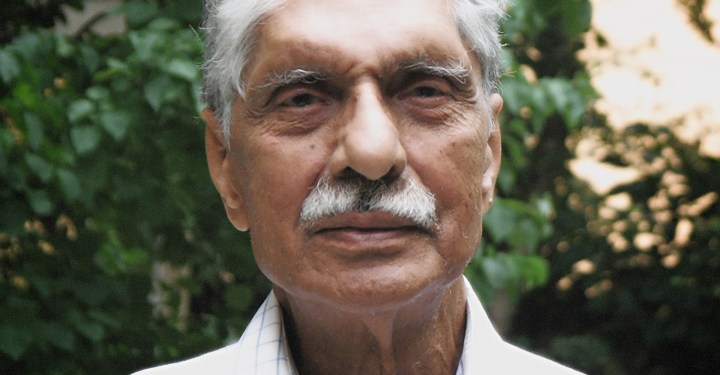TRIBUTE: ES REDDY
Remembering a giant of the international anti-apartheid movement

The international campaign to isolate apartheid South Africa through sanctions, boycotts and support for activists on trial was a critical element in bringing liberation to the country. ES Reddy was a vital part of the campaign.
Enuga S Reddy, who died on 1 November 2020, was one of the main architects of the global anti-apartheid movement.
Appointed as secretary of the UN Committee Against Apartheid in 1963, he soon realised that Western governments would take no meaningful action against apartheid unless there was a groundswell of public opinion within their own countries.
So, with initiative and imagination, he set about using the resources of the UN to help build an international grassroots movement.
Reddy was born near Madras in 1924 into the Indian movement for independence from Britain. His father was chairperson of the local branch of the Indian Congress Party. In 1946 he went to New York as a student and learnt about the Indian campaign of passive resistance to apartheid in South Africa, and the African miners’ strike.
In the same year, he met the South African delegation, headed by ANC president Dr AB Xuma, that came to New York to lobby for UN action against race discrimination in South Africa. With a group of Indian students, he joined a demonstration outside South Africa’s New York consulate.
In 1949 he started work at the UN as a researcher and in 1963 was appointed as secretary of the newly formed UN Special Committee on South Africa. From 1976 to 1984 he served as the Director of the UN Centre Against Apartheid.
Later, Reddy explained how he was influenced by the split in attitudes towards the UN in 1961 over its failure to take action on the murder of Patrice Lumumba in the Congo.
Some thought anti-imperialists should resign from the UN, but Reddy thought they should stay and fight from within the organisation.
He had no illusions about the attitude of Western governments to apartheid, but he turned the West’s boycott of the UN Special Committee to advantage. With the backing of the committee, whose members were all from African and non-aligned countries, he set up contacts with the southern African liberation movements.
He did things, he said, “that nobody in the UN would have thought of doing. If people knew what I was doing in terms of contacts with the liberation movement and the anti-apartheid movement, I would have got into trouble constantly and might have been thrown out of the job.
“But I managed, partly because I had the protection of the committee.”
The committee had important support from UN Secretary-General U Thant, and its first chair, Guinea’s UN ambassador Diallo Telli, attended the founding conference of the Organisation of African Unity (OAU) in Addis Ababa in 1963.
The OAU endorsed a report about repression in South Africa prepared by the Special Committee, and back in the US, the State Department, headed by Adlai Stevenson, came on board by announcing a US arms embargo, although it made clear it rejected any further sanctions.
Throughout the apartheid period, the imposition of mandatory economic sanctions was the main aim of the global solidarity movement. But Reddy recalled how a conversation with an official in the US State Department in the mid-1960s made him realise that Western governments would not take action without pressure from their own electorates.
He said, “it made me start thinking – how do we create a constituency [for action]?” His answer was to use the UN Special Committee to publish educational materials about apartheid, to subsidise international conferences, and to liaise with the liberation movements and national anti-apartheid movements to launch global anti-apartheid campaigns.
As well as a close friendship with Oliver Tambo and contacts with the governments of Sweden and Norway, Reddy developed relationships with the British, US, Dutch and other anti-apartheid movements.
In the case of the cash-strapped British AAM, support from the Centre Against Apartheid was a life-saver, whether in the form of subsidies for publicity material, organisation of conferences or resources like the UN register of artists who broke the cultural boycott by performing in South Africa.
One of Reddy’s most important initiatives was the part he played in launching the campaign for the release of Nelson Mandela.
He told how, at the 1977 Lagos World Conference Against Apartheid, Mac Maharaj, recently released from imprisonment on Robben Island, suggested celebrating Mandela’s 60th birthday the following year. But nobody knew the date.
Reddy wrote to Winnie Mandela and the ANC HQ in Lusaka and several months later received a reply – 18 July. In the British House of Commons, Prime Minister James Callaghan sent 60th birthday greetings.
The campaign for Mandela’s release grew, culminating in the “Nelson Mandela: Freedom at 70” birthday concert at Wembley stadium in 1988, broadcast to an audience of millions in over 60 countries.
Reddy was appointed UN Assistant General Secretary and left the UN in 1985.
He continued as a Trustee of the International Defence and Aid Fund. He leaves an invaluable collection of writings and documents about UN action against apartheid, and his insights into the strategies of the global anti-apartheid movement are an important source for historians.
Reddy was committed, unassuming and, most important, highly effective – all qualities much needed in a world that seems to be spinning out of control. He was an inspiration to everyone working for a more inclusive and equal society.
We send condolences to his wife, Nilufer Mizanoglu Reddy, daughters, Mina Reddy and Leyla Tegmo-Reddy, and to his grandchildren and great-grandchildren. DM
Christabel Gurney is on the Anti-Apartheid Movement Archives Committee, a former British Anti-Apartheid Movement executive committee member, and former editor of Anti-Apartheid News.


















 Become an Insider
Become an Insider
Comments - Please login in order to comment.